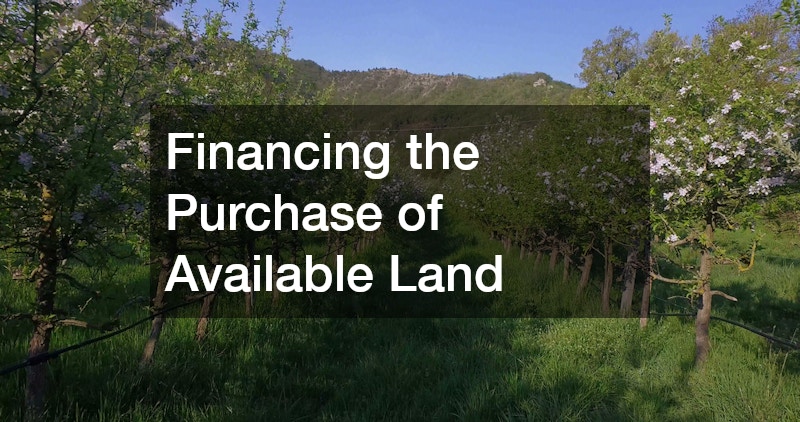Finding available land is an exciting and significant step for anyone looking to build, develop or invest. It requires careful planning and evaluation to ensure the property aligns with your goals and long-term vision.
How to Determine Your Needs and Goals
Assessing Your Intended Use
Before exploring available land, determine how you plan to use it. Whether it’s for residential housing, a commercial venture, agricultural production or recreational use, having a clear purpose will shape your decision-making.
For farming or rural projects, factors such as soil quality, rainfall and climate play a vital role. In contrast, residential and commercial buyers should pay close attention to zoning regulations, access roads and nearby infrastructure.
It’s also worth considering potential future needs. Choosing available land that can support expansion or redevelopment allows flexibility for years to come.
Identifying Essential Features
Each parcel of available land comes with unique characteristics that determine its suitability. Key considerations include size, slope, and accessibility to power, water and transport routes.
Environmental factors—such as flood risks, vegetation, and water access—also influence usability. Thoroughly evaluating these elements ensures you select a property that meets both immediate and future objectives.
Understanding the surrounding community and the distance to schools, shops, and other amenities is just as important, particularly for residential or mixed-use developments.
Where to Start Your Land Search
Using Online Resources
Technology has made searching for available land more convenient than ever. Online real estate portals and dedicated land listing sites allow you to filter by location, size, and price to match your criteria.
Many of these platforms also provide detailed information about zoning, topography, and recent sales trends. This data helps you make informed comparisons and assess market value with confidence.
For those looking to explore rural or regional opportunities, specialist sites focusing on farmland and acreage can offer valuable insights and listings that might not appear on traditional property sites.
Connecting With Real Estate Agents
Local real estate agents play a crucial role in finding available land that suits your needs. Their in-depth market knowledge gives you access to newly listed and even off-market opportunities.
Agents can also explain zoning rules, development potential, and the practical aspects of negotiating purchase terms. Working with an experienced professional simplifies the process and saves valuable time.
In addition, they often collaborate with surveyors, legal advisers and financial consultants to ensure every stage of your purchase runs smoothly.
Legal Considerations When Buying Available Land
Understanding Zoning Laws
Zoning regulations determine what can be built on a parcel of land and how it can be used. These laws vary across local councils and can affect everything from building heights to setback requirements.
Before committing to a purchase, review all relevant planning schemes or speak with your local council to confirm compliance. Understanding zoning early prevents costly surprises later in the development process.
Engaging a planning consultant or property lawyer can provide clarity and ensure that your chosen land aligns with your intended use.
Checking Title and Ownership
Verifying ownership is a critical step before buying available land. A proper title search confirms the seller’s legal right to transfer ownership and reveals any encumbrances or easements attached to the property.
Uncovering issues such as unpaid rates, disputes, or restrictive covenants early protects your investment. Working with a conveyancer or solicitor experienced in land transactions can safeguard you from potential complications.
Due diligence in this phase helps you purchase confidently and avoid future legal disputes.
Evaluating the Suitability of Available Land
Conducting On-Site Visits
Visiting available land in person provides insight that online listings can’t fully convey. It allows you to examine the terrain, assess access routes, and visualise how the land fits your intended purpose.
Pay attention to environmental conditions such as drainage, erosion risks and surrounding land use. These observations can influence development costs and long-term practicality.
Being on-site also helps you imagine future layouts—whether it’s a home, farm, or business operation—giving you a clearer perspective on its potential.
Engaging Professional Inspectors
Hiring qualified professionals ensures that every detail of your available land purchase is carefully examined. Surveyors can confirm boundaries and measurements, while environmental specialists identify issues such as soil quality or contamination.
If the land has existing structures or utilities, having them inspected helps verify functionality and compliance with local standards.
These expert evaluations provide confidence that your investment is sound and aligns with your plans for development or use.
Financing the Purchase of Available Land
Exploring Financing Options
Financing available land differs from purchasing a home. Banks and lenders often view vacant land as higher risk, which can affect loan terms and deposit requirements.
Some buyers choose to work with lenders offering tailored land loans or seek alternative finance options through credit unions or private financiers.
Comparing interest rates, repayment terms and loan conditions across several providers helps you secure favourable terms that fit your budget.
Understanding Costs and Budget Planning
The total cost of acquiring available land extends beyond the purchase price. You’ll need to budget for deposit payments, legal and surveyor fees, stamp duty, and ongoing costs such as council rates and maintenance.
If you plan to develop the site, factor in additional costs for permits, infrastructure connections and design work. A clear, realistic budget will prevent overspending and support a smoother financial process.
Working with a financial adviser can also help you assess the long-term value of your investment and structure your finances efficiently.

